#immortality (rusa)
Explore tagged Tumblr posts
Text
OC Intro: Zatar/Zatur the Wrath Also a quick introduction to Spiritbloods
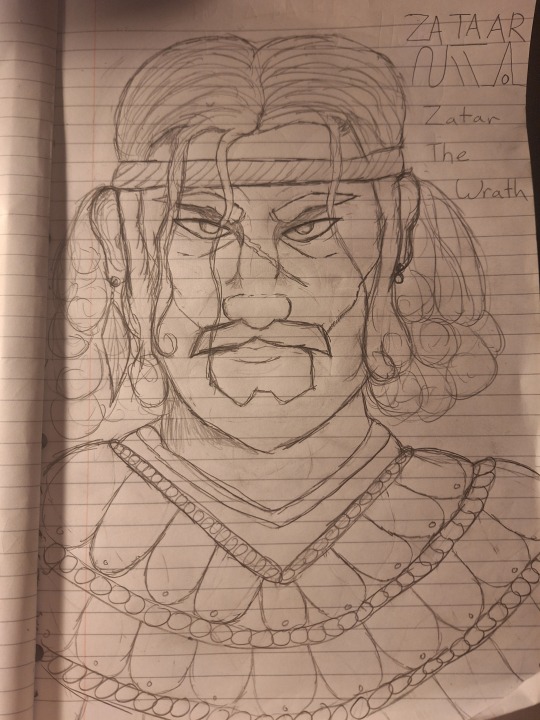
Hello everyone! I did a poll a while ago to see which OC I should introduce to y'all on here. The winner was Zatar, however then life happened and oops that was almost a month ago. Better late then never! Here is Zatar, The Wrath of Akard, Bane of Naloch, Terror of Apuna. The next poll will be up later tonight!
CW: Minor mention of s*icide
Name: Zatar/Zatur
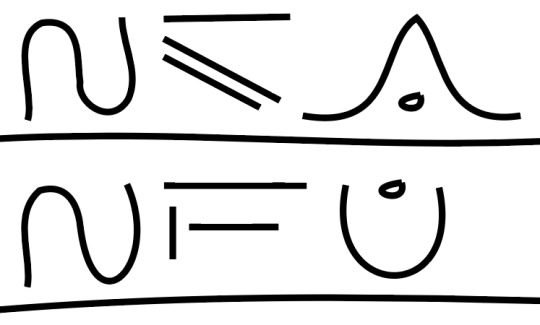
Zatar has had two names, these being Zatar and Zatur, at different parts of his life. This is because he has gone in and out of the hierarchy of nobility, he was born into a noble family and thus given the noble name, Zatar, however after the death of his father he lost the privilege of having a noble name, thus being given the commoner version of that name, Zatur, and then his name was rendered back to Zatar yet again when he was declared a noble by Akard. Here is an explanation of Kishic Noble names.
This Continues below the cut!
Family
Father: Kerim/Turu, Ekiku (A minor noble, a charioteer) (Dead)
Mother: Rusa, Spirit Blooded, Warrior (Unknown)
Sister: Hiruha/Ruya, Brothel Worker (Alive)
Niece: Sumi, Baby, (Alive)
Grandmother: Batricca, Immortal Queen of The 17 Tribes of the Batri
No children
No Partner
Homeland/Place of Origin
Labisa, the Red Cedar Mountains Region of Kishetal
Ethncity and an Intro to Spiritbloods aka Demigods
Eastern Kishite and Duaditaxi aka Batri
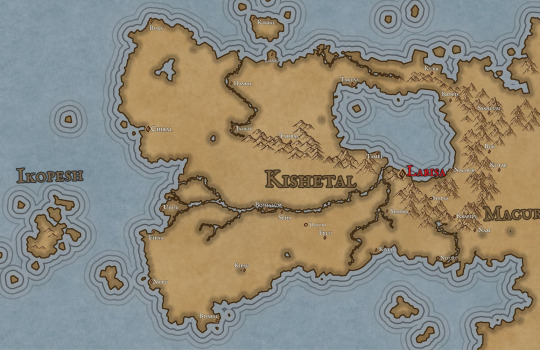
Spiritbloods
A spiritblood, sometimes called a demigod (though they are not related to the actual deities) is the progeny of a human or human-descended forestfolk and a spirit. Only certain spirits are capable of producing a child with a human. They are almost always born from a human mother, as most spirits detest the physical limits which come from carrying a physically static being. Unlike forestfolk, Spiritbloods are magical in nature and not merely the result of magical mutation. It is thus technically possible for Spiritbloods to shed some amount of wild magic. They are typically not able to wield magic and change their form in the same sense as a spirit, as their physical body forbids it, nor are they capable of using sagecraft. Magic rather manifests in the body itself, shaping and warping it beyond the confines of normal humans. Spiritbloods are prone to having an unusually large stature and display incredible physical strength and resilience.
Alongside having incredibly resilient skin and bones, Spiritbloods are not affected by old age, disease, and most poisons. Spiritbloods can still be killed whether through battle (though killing a Spiritblood in this way is a heroic feat indeed), starvation, extreme cold, fire, drowning, falling, etc. Though a spirit blood's body will not die or deteriorate from old age, the mind will wither with the ages, most that have not already died are rendered all but immobile and unresponsive by around 2000 years, most will die shortly after that.
For reasons that are not entirely known, spiritbloods are naturally repulsed by others of their own kind, and more often than not when two Spiritbloods meet, the encounter will end in blood.
In ancient times there were many spiritbloods, they ruled cities, and tribes and warred constantly with one another. The massive walls which now guard the cities of the Green Sea were made by and to protect from the terror of these single person armies.
The children of Spiritbloods inherit some of their parent’s might, though they are smaller in stature, not as superhumanly strong, and are not immune to aging (though they may age slower). The added strength and resilience of their bloodline typically carries down about three generations, becoming less prominent with each generation, before it becomes unnoticeable. Individuals which fall into these three generations below a true Spiritblood are called Spirit-Blooded.
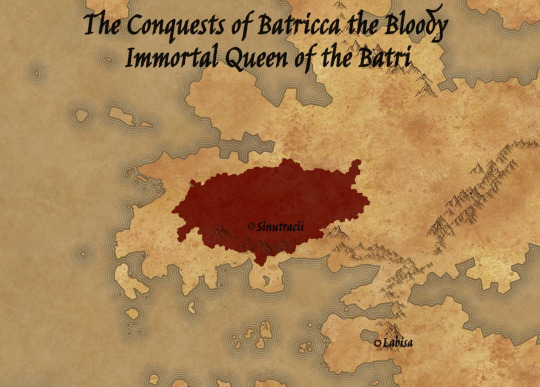
History
Zatar was born the second son of the Spirit-blooded Warrior, Rusa, and the Kishite Charioteer, Kerim, approximately 17 years before the start of the series.
Rusa is the seventy-third daughter of the Spiritblood queen of Batri, Batricca. It is the custom of Batricca to kill her male children and to segregate her daughters. For each girl child it is decided at the age of 3 whether the child will be strong or puny (puny is relative as even the shortest of Batricca’s daughter’s was 6’4, the tallest was 7’7) strong children are raised as warriors, in time becoming part of Batricca’s special guard, the 14 Stars. The 14 Stars are constantly cycled through and replenished as girls reach the age of 45, at which point they will be married off or sent to other tribes to act as agents or politicians (Note that while these Spirit-blooded children are not immortal they can live to around 130). Puny girls were raised to be wedded off for political purposes, as a way to imbed Batricca’s blood and influence in tribes both in and outside of her control. It has been said that every 20th person in the North can trace their lineage to Batricca.
Rusa was one of those children, raised to be one of the 14 stars. However at the age of 19, while traveling south to spy on the island of the Clay Women, Kulaya, her ship was swept off course, where instead was beached on the northern shores of Korithia. After a bloody battle, she was captured and sold into slavery. She was bought as a curiosity by a man from the Kishite city of Labisa. She was thus taken across the sea, far from her homeland.
It was in Labisa that she met a minor lord, Kerim. Kerim was almost instantly smitten, and would sneak the captured warrior drinks and food from where she was kept. During this time she learned to speak Kishite. He would ultimately sell his prized horses in order to buy and subsequently free her. Rather than leaving, as he had expected she demanded to be taken to his home. He did so, showering her with what gifts his minor nobility could offer.
It is not entirely clear why Rusa stayed, perhaps she loved him as much as he loved her, perhaps she loved the luxury of the warm Kishite sun and Kishite wine, what is clear is that soon she was pregnant. Despite his urges, the two never married. When their first child, a daughter, was born, he begged the king of Labisa, Hutbari, for permission to give their daughter a noble name, something which would not typically be afforded to a child born out of wedlock. Hutbari gave his permission, but for a hefty price, the equivalent of 4 oxen. Kerim paid the king, and subsequently named the daughter, Hiruha.
Kerim would go on to win some acclaim, fighting Makurians raiders, though many mocked him over his giant of a partner, and the destitution that had come of it. Some wondered if she and Hutbari's giant slave boy could be related at all as they had arrived in Labisa at roughly the same time (Narul, who would have only been 3 or 4 at the time).
Three after the birth of Hiruha, Rusa would give birth once again, this time, to a boy. Once again Hutbari agreed, but this time at an even more ridiculous price, 6 oxen. Kerim could only pay the equivalent of 3, but swore an oath to pay back the king, essentially going into debt. He named this new boy for his own father, Zatar.
Kerim has all but bankrupt himself in buying the names of his children and in spoiling his wife. He was forced to free his slaves, to sell the last of his cattle, and even to allow strangers to live in his stables.
When Zatar was around the age of 4, Rusa mysteriously vanished, presumably leaving Kerim's home never to return.
Kerim searched frantically, running around the city of Labisa like a man possessed. Yet he could find nothing, he paid mercenaries, messengers, merchants, and bards exorbitant amounts of wealth that he did not have, only to reveal nothing.
Kerim's problems would only get worse as word reached Hutbari that the charioteer had been using wealth that he was owed. As such Kerim was indirectly stealing from the king himself. Kerim and his two children were dragged to the palace.
It is customary for those unable to pay off a debt, to instead be pressed into debt slavery, working until such time as their debt is considered to be paid off. However it is considered taboo for nobility to be pressed into slavery. To avoid this particular issue, Hutbari stripped Kerim and his family of their noble titles and stature. Kerim became Turu, Hiruha became Ruya, and Zatar became Zatur. Kerim was subsequently enslaved, his two children placed into the care of a temple.
Broken hearted by the loss of his love, his title, and his dignity, Kerim/Turu threw himself into the Lake, orphaning his two children.
The two would remain in the temple for sometime, until around the time when Zatur reached the age of 7 and his sister 10, at this time they were ejected from the temple. The two lived as street urchins, reliant on scraps and the occasional bit of charity. Despite their spirit-blood heritage, malnutrition kept them small. Zatur became adept at hunting vermin such as rats and stealing horned-rabbits.
In time the two would find a home in a brothel. The two would be allowed a roof over their head, and an occasional meal, in exchange Zatur would act like the brothel cat, hunting the mice and rats lived in the beds and walls, and Ruya would clean, with the additional understanding that when she came of age she would become one of the prostitutes.
With no other option, the two agreed. Though they no longer slept in the mud, the two were still terribly mistreated, both slept on the stone floor, often they were only given bread once or twice a week, and the two were regularly mocked by the clientele. Ruya did find some companionship with the other women and men who served there. Zatur was not so lucky, the boy was cold and angry, prone to fits of rage.
In order to quell his anger he would sneak from the city into the forest to hunt, using spears of wood and stone he made himself. He proved to be an adept hunty, bagging his first boar at the age of 13.
When the owner of the brothel caught wind of this particular catch, he made a deal with Zatur. For each week that Zatur could produce a boar, deer, or other large game animal for the brothel, his sister, now of age, would be relieved of her duties. Zatur agreed.
Zatur became known as a prolific hunter, seen walking through gates with boars, deer, even a bear draped on his shoulders or dragging behind him.
On one day while Zatur had gone out hunting, the brothel owner reneged on his promise, allowing a high-paying noble to sleep with Ruya.
Ruya tried to keep this fact a secret, however in time she became pregnant. Enraged Zatur attacked the brothel owner, ripping his ear from his head, permantely disfiguring the man, and very nearly killing him. Only Ruya’s intervention and the appearance of guards who had heard the commotion, saved the brothel owner from the boy’s wrath.
The punishment for an attack of that ferocity would almost certainly be slavery or even death. Ruya negotiated a different price. She would stay at the brothel, imprisoned there, the property of the brothel, while Zatur would be banished from its walls and forbidden from seeing her.
Zatur now wanders the streets again, sleeping in corners or under balconies, he still hunts for game, selling it for clothes and a dry place to rest his head. He and Ruya occasionally meet in secret so that he can see his niece, Sumi, and so that she can sneak him bread and beer and he can give her game and medicinal plants.
It is here, in this state of destitution, that Zatur first meets Akard.
Appearance
Zatur when we first meet him is skinny and malnourished, his black hair is long and scraggly, and his skin is paler than that of the average Labisian. His eyes are sharp, yellow and hawk-like in their intensity. Once given access to proper nutrition he grows at an incredible rate, his Spirit-blooded heritage shining through, becoming tall and broad though still dextrous and quick. Ruya undergoes a similar transformation.
Personality
Zatur is a person of few words, he rarely smiles and is possessed by a vicious temper. He has an intense hatred for nobility (with the exception of Akard), his birth parents, and in essence anyone that he believes holds any sort of power or authority over him. His sister is perhaps the closest thing he has to a friend. He easily falls into obsession. He has little care for questions of honor or morality.
Gender/Pronouns
Cis-man He/Him
Sexual Orientation
Aromantic Asexual
Relationships
Zatur has no interest in any sort of romantic or sexual relationship. His feelings towards Akard are almost worshipful, cultic, a father-son relationship taken to an extreme.
Favorite Color
Red
Favorite Food
Venision, served rare with garlic and no other seasoning.
Biggest Fear
Humiliation
Sage?
No
Literate?
No
Excerpt
Zatur sprang forward with a howling cry, rather than opening himself to attack by trying to maneuver around the shield, he thrust directly at it. He struck with such ferocity that the blade carved its way through leather and wood, impaling the emblazoned leopard between its eyes, and shattering the once impenetrable shield. The cruel blade slammed into old noble's body and could not be stopped, where a normal man’s attack may have found itself thwarted by the sheet of bronze scales, Zatur was no normal man. His spear punched through the man’s armor, bringing bronze scales with it, embedding them in Atab’s gut. Those watching could see the back of the man’s armor tent as the spear erupted out of his back, completely impaling him.
@patternwelded-quill @flaneurarbiter @skyderman @blackblooms @roach-pizza @illarian-rambling @dezerex @theocticscribe @axl-ul, @persnickety-peahen, @surroundedbypearls
#testamentsofthegreensea#writeblr#writing#fantasy#fantasy writing#worldbuilding#fantasy world#world building#oc info#ocs#oc art#original character
6 notes
·
View notes
Photo
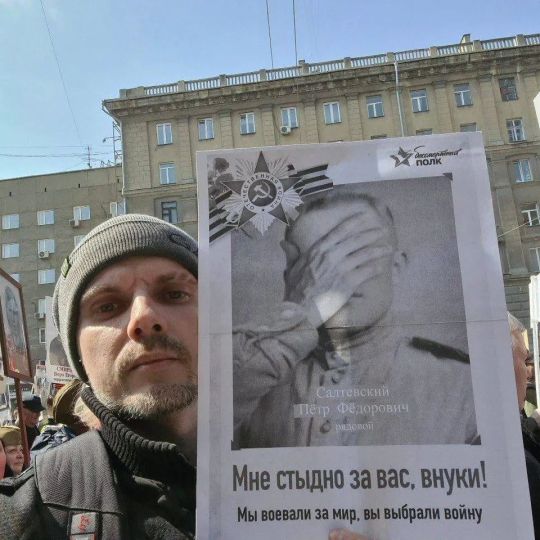
In Novosibirsk, a local activist was detained at the Immortal Regiment rally. He came out with two posters: "I'm ashamed of you, grandchildren" and "We defeated that fascism, we will defeat this one." I can only add from myself that he now has a ticket to another life. Every Russian who has a certificate from the police that he was detained for picketing before the war is a self-insured Russian. В Новосибирске на акции "Бессмертный полк" задержан местный активист. Он вышел с двумя плакатами «"Мне стыдно за вас, внуки" и "Победили тот фашизм, победим и этот". Могу только добавить от себя, что у него теперь есть билет в другую жизнь. Каждый русский, имеющий справку из милиции о том, что его задержали за пикетирование против войны, является самозастрахованным россиянином. Novosibirske per Nemirtingojo pulko mitingą buvo sulaikytas vietinis aktyvistas. Jis išėjo su dviem plakatais: „Man gėda dėl jūsų, anūkai“ ir „Mes nugalėjome tą fašizmą, nugalėsime šį“. Nuo savęs galiu tik pridurti, jog dabar jis turi bilietą �� kitą gyvenimą. Kiekvienas rusas, kuris turi pažymą iš policijos, jog jis buvo sulaikytas dėl piketavimo prieš karą, yra apsidraudes rusas. #fightforua #зсу🔰 #украіна #ukrainewillresist #ukraina #ukrainewar #українапрацюємо🇺🇦 #українапереможе #ukrainewar2014_2022 #яАзов #war_blog_nato_ua_alen #nato_ua_alen🇱🇹🇺🇦🇺🇸🇦🇴 fightforua.org Subscribe👊🏻👉https://youtube.com/channel/UCawfUXdCuVEmdKOahYReb0A (at Новосибирск) https://www.instagram.com/p/CdVzUZRKTcU/?igshid=NGJjMDIxMWI=
#fightforua#зсу🔰#украіна#ukrainewillresist#ukraina#ukrainewar#українапрацюємо🇺🇦#українапереможе#ukrainewar2014_2022#яазов#war_blog_nato_ua_alen#nato_ua_alen🇱🇹🇺🇦🇺🇸🇦🇴
2 notes
·
View notes
Text
The Flames of War
@antlered-deity from here x
A rather tall skeleon, and his average height brother, wandered up to the shrine, squabbling the whole way.
‘this is stupid.”
“IT’S NOT STUPID.”
“yes it is, there’s no such th- ow!”
“QUIET. DON’T FINISH THAT SENTENCE. YOUR BLASPHEMY WILL FUCK UP MY PRAYER.”
“tch...” Arum rubbed his now-throbbing skull as he walked with his brother, glaring. Tox was bringing along a red, high-quality sword.
When they reached the shrine, Tox nodded to the priest, whom he’d seen betore, then went to where offerings were set down to present the sword, which he had forged himself.
Arum glared daggers after his brother, then turned his glare to the short skeleton cleaning up around the shrine, hostility coming off of him in waves.
“tch... what a waste of mountain space.”
4 notes
·
View notes
Link
VOLVERSE PÚBLICO
Las transformaciones del arte en el ágora contemporánea
BORIS GROYS
Colección:Futuros PróximosTraducción de:Paola Cortes RoccaISBN:978-987-1622-30-6Páginas:208
Recordemos la conocida frase de Joseph Beuys: “Todo ser humano es un artista”. Esta máxima tiene una larga tradición que se remonta al marxismo temprano y a la vanguardia rusa. Lo que se entendía en ese momento como utopía se ha convertido hoy en una obligación: todo ser humano tiene que asumir una responsabilidad estética por su apariencia frente al mundo, por el diseño de sí. Aunque no todos producen obras, todos son una obra.
A fines del siglo xx, el arte entró en una nueva era: la de la producción artística masiva. Mientras que el anterior fue un período signado por el consumo masivo del arte, en nuestra época la situación se modificó al compás de los avances técnicos y de los cambios en los criterios que utilizamos para identificar qué es arte y qué no lo es. El acceso relativamente fácil a variados dispositivos para la producción de imágenes combinado con Internet como plataforma de distribución global alteró la relación tradicional entre productores y espectadores: las redes sociales y los sitios como Facebook, Twitter, YouTube y Second Life ofrecen a la población global la oportunidad de mostrar sus fotos, videos y textos de un modo que no puede distinguirse de cualquier otra obra de arte conceptualista o post-conceptualista. Asistimos a la sustitución del campo unificado de la cultura de masas por un escenario de fragmentación en el que millones de productores generan textos e imágenes para un espectador que no tiene suficiente tiempo para leer y ver. En los ensayos que componen Volverse público, Boris Groys describe diversos aspectos de esta transformación radical del campo del arte, desde sus manifestaciones embrionarias en los proyectos de artistas de vanguardia como Duchamp, Kandinsky y Malevich hasta la actualidad, en la que la actividad artística pareciera no ser más un destino exclusivo sino un gesto débil, una tarea que asumimos cotidianamente en el nuevo ágora mediática
via /cajanegraeditora.com.ar/libros/volverse-publico/

PENSANT EN BUCLE Boris Groys 05.11.2020 – 07.02.2021
Comissari: Manuel Fontán del Junco
Avui dia el vídeo és el mitjà dels mitjans: domina les notícies, les xarxes, l’art i la propaganda ideològica i religiosa. Als seus tres videocollages sobre la iconoclàstia, el ritu i la immortalitat, Boris Groys (Berlín Est, 1947) es revela com un autèntic mèdium dels rituals ambivalents de la paraula i la imatge que constitueixen la nostra cultura.
No hi ha cap dubte que avui dia el vídeo és el mitjà dels mitjans: sofisticat o domèstic, dels de la CNN i la MTV als amateurs de Youtube, Instagram o Tik-Tok, els vídeos es produeixen i es disseminen a bilions a les xarxes socials. Dominen les notícies, la publicitat, la propaganda política, ideològica i religiosa i també l’art. I les seves imatges en moviment s’introdueixen, cada cop més, en la plàcida calma del museu.
En els tres vídeos de Pensant en bucle, Boris Groys es revela —en la seva primera exposició a casa nostra— no tan sols com l’agut filòsof, crític d’art i teòric dels mitjans que ja és, sinó com un autèntic mèdium del mitjà dels mitjans, que posa en escena amb intel·ligència els ambivalents rituals de la paraula i la imatge que constitueixen la nostra cultura.
Aquesta exposició és una instal·lació audiovisual per a la qual el filòsof, curador i artista s’ha apropiat de fragments de pel·lícules i documentals, combinant cadascun dels tres collages fílmics resultants amb un assaig de viva veu. Els videocollages, produïts entre 2002 i 2007, els va publicar el Zentrum für Kultur und Medientechnologie de Karlsruhe el 2008.
Les imatges de Delits iconoclastes, Cossos immortals i La religió com a mèdium no comuniquen ni simplement il·lustren continguts teòrics; més aviat serveixen de còmplices per pensar en vídeo, fent jugar les idees amb les imatges en moviment en un bucle continu. Pensant en bucle és un exercici a mig camí entre l’art conceptual i la «filosofia audiovisual» (Peter Weibel) que cura imatges i veus pròpies i alienes i concerneix com pocs la ubiqua bombolla mediàtica en què transcorren les nostres vides...
https://ajuntament.barcelona.cat/lavirreina/ca/exposicions/pensant-en-bucle/491
Bibliografia:
BISHOP, Claire. (2012). Artificial Hells. Participatory art and the politics of spectatorship. London : Verso Books
DUARTE, Ignasi ; BERNAT, Roger (2009). Querido Público. Murcia: Cendeac
GROYS, Boris (2014). Volverse público. Las transformaciones del arte en el ágora contemporánea. Buenos Aires: Caja negra editora.
JOUANNAIS Jean-Yves (2014) . Artistas sin obra. Barcelona: Acantilado
RANCIÈRE, Jacques (2010). El espectador emancipado. Castellón: Ellago ed.
0 notes
Quote
It was commong knowledge that Ana was reckless with her life, the kind of girl who would play Russian roulette with a loaded gun. It made her seem almost immortal, the casual way she flirted with death.
Sad Girls, by Lang Leav.
“Era conocimiento común que Ana era arriesgada con su vida, el tipo de chica que jugaría a la ruleta rusa con una pistola cargada. La hacía ver casi inmortal, la forma casual en la que jugueteaba con la muerte.”
6 notes
·
View notes
Text
Breve: El MMO free-to-play Skyforge llegará a PS4 durante el mes de marzo
http://ift.tt/2iefP43
La editora de origen rusa My.com sigue estando de actualidad. Después de hacerse cargo de Armored Warfare y Warface, anuncia que durante el mes de marzo Skyforge, un MMO free-to-play desarrollado por Allods Team en colaboración con Obsidian, llegará a PlayStation 4. Skyforge ofrece hasta 14 clases diferentes (se puede cambiar cuando se quiera) y un sistema de combate en tiempo real basado en combos y habilidades. Los jugadores que se registren en la web oficial recibirán el Immortal Pack que incluye varios objetos cosméticos. Leer noticia completa y comentarios » from ElOtroLado.net http://ift.tt/2lhZCzt via IFTTT
0 notes